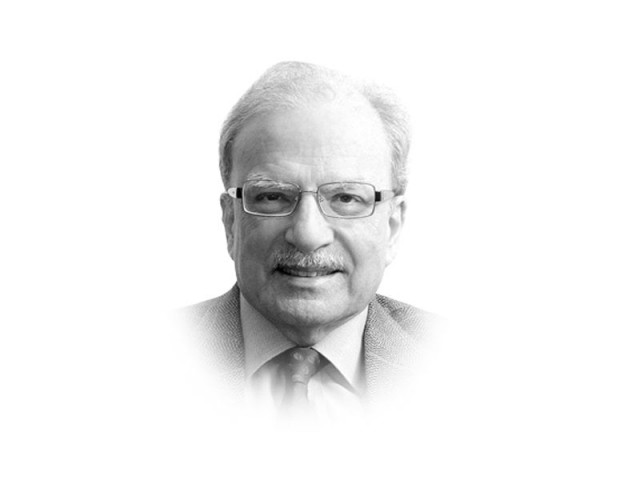Building irrationality into public policymaking
The Bhutto period saw major disruptions and a sharp slowdown in the rate of economic growth

The writer is a former caretaker finance minister and served as vice-president at the World Bank
Thaler had won a measure of fame well before the award of the coveted prize. In a co-authored book titled Nudge that went on to become a bestseller, he expanded on his pioneering work that argued that people are predictably irrational. This belief had upended long-established assumptions on which much of economic thought was founded. It also brought new insights into the making of public policy.
Thaler’s contribution led to the founding of what has come to be known as ‘behavioural economics’, a growing branch of the discipline to which non-economists such as Daniel Kahneman, a clinical psychologist originally from Israel, had made enormous contributions. Daniel Kahneman won the Nobel Prize in 2002. He had done most of his work in collaboration with Amos Tversky, another Israeli psychologist, who would have also won the Nobel Prize had he lived. Another behavioural economist, Robert J Shiller who was among the winners of the Nobel Prize in 2013, hailed Professor Thaler who teaches at Chicago as “one of the most creative spirits in modern economics.”
Classical economic theory was founded on one basic assumption. There was the strongly held belief that survived for a very long time according to which people behaved rationally in deciding about things that affected them. This assumption found its way into complex mathematical models that were developed to understand the working of the economy at both micro (individual, household or firm) levels and macro (the state and country) levels. Economists understood that rationality was not literally true but that it was close enough to be the basis of understanding about the way people behave.
Kahneman also wrote the best-selling book Thinking, Fast and Slow in which he said the human brain was divided into two distinct parts: the rational and the irrational. The irrational was the dominant part, taking decisions 90 per cent of the time. In fact, the rational part is basically lazy; it comes into action with some reluctance. One example when that happens is when a mathematical problem has to be solved. What the other part does is based on experience, biases, training even inheritance. While driving a car, the person at the wheel swerves to avoid a pedestrian who may have suddenly come in his way. He does that not because the brain has made a quick calculation of what needs to be done. He does out of the habit born from experience.
There are a number of ways in which behaviour in a place such as Pakistan can be understood in terms of irrational behaviour. For instance, Malcolm Darling, a British official working in Punjab, noticed that there was a major difference in the way Muslim and non-Muslim peasantry spent money. Muslims were inclined to be wasteful in spending more than they could afford on weddings, funerals and functions which had large attendance. This they did even if they had to borrow. This type of behaviour had led to indebtedness, with Hindu merchants as the lenders. Land was used as the collateral for the loans resulting in the loss of land to Hindu banias.
This worried the British rulers who were still recovering from the 1857 Indian Mutiny. The British were able to put down the rebellion with the help of Muslim soldiers. They were keen that this segment of the population should not come under stress. The government response took the form of legislation, the Land Alienation Act of 1901. The act divided the population of Punjab into two categories, agriculturists and non-agriculturists. Muslims and Sikhs were placed in the first category and Hindus in the second. Not able to own land, Hindus turned to activities such as storage and marketing.
Another example is from more recent times in Pakistan. Millions of Pakistanis have gone to the Middle East for work. They have sent billions of dollars back to their families. Some of this money was used by the households receiving it to improve their living standards — by building new or improving old houses, by spending on better clothing, by being extravagant in celebrating births and weddings. A better and more rational use would have been to save for the future when the source of this income dried up.
Works such as those of Kahneman and Thaler should inform the writing of Pakistan’s economic history. It is instructive to compare policymaking in two eras in Pakistan: the periods of Ayub Khan and Zulfikar Ali Bhutto. The former, by both training and temperament, was highly deliberative before taking major decisions. He relied on deep study done by experts. Upon taking charge of the country, he set up a number of commissions to come up with recommendations on a number of issues. Bhutto, on the other hand, was highly impulsive, moving in with changes in the areas of the economy of which he had poor understanding. Consequently, during the Ayub Khan period, we saw the highest rate of economic growth. The Bhutto period saw major disruptions and a sharp slowdown in the rate of economic growth.
Published in The Express Tribune, October 16th, 2017.
Like Opinion & Editorial on Facebook, follow @ETOpEd on Twitter to receive all updates on all our daily pieces.
















COMMENTS
Comments are moderated and generally will be posted if they are on-topic and not abusive.
For more information, please see our Comments FAQ